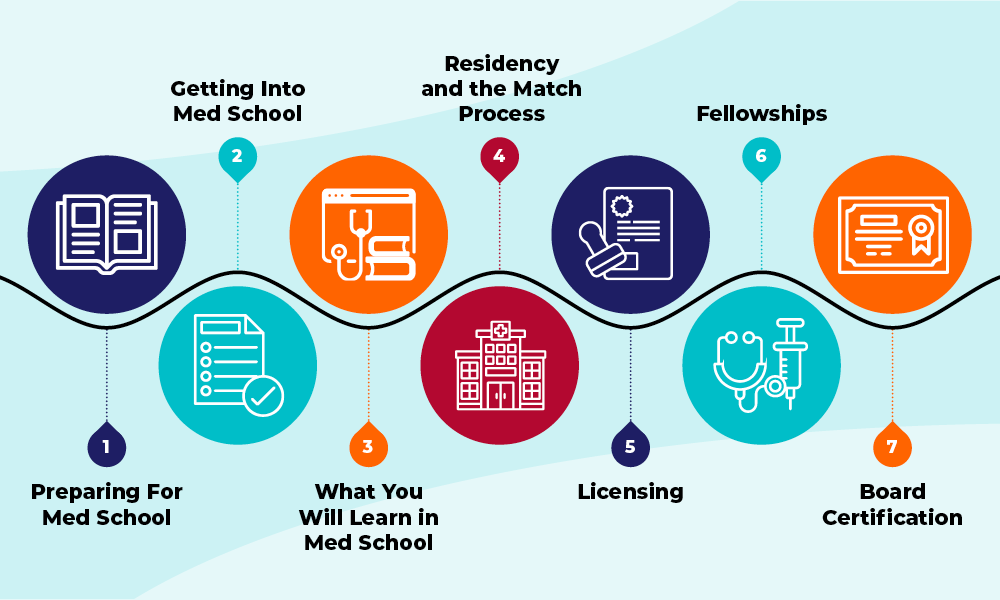Deciding to attend medical school is probably one of the most important decisions you will ever make.
While some aspiring physicians are driven to become a doctor from when they were young, others are approaching medicine with a newfound wonder, appreciation, or motivation that perhaps stems from a personal experience. Whatever drives your ambition to pursue a career in medicine, St. George’s University seeks to help you make your dream a reality.
To be sure, from applying to med school to residency and beyond, the journey to become a doctor is not an easy one—it takes motivation, dedication, and discipline to succeed through each stage of the process. But in the end, your dream will be within reach.
We understand you likely have questions. This resource provides information and advice to help guide you at each stage of the journey to MD. Good luck!
Preparing for med school in high school and college
Let’s start at the very beginning. If you are in high school or college and looking to enter the field of medicine, there are steps you can take now to prepare yourself for medical school.
In this section, learn more about undergraduate classes, suitable majors, and even extracurricular activities, such as clubs and volunteer opportunities, that can be beneficial to a prospective medical student. You’ll also learn about the range of possibilities one can do with an MD besides traditional medicine and the potential benefits of a dual-degree program like SGU’s combined Doctor of Medicine (MD)/Master of Public Health (MPH) or Doctor of Medicine/Master of Science (MSc) programs.
Explore preparing for med school in high school and college
Getting into med school
How does one actually get accepted to medical school? Well, there are a few core aspects to consider when applying:
- Your GPA,
- Your MCAT score,
- Your application materials like your personal statement
Remember to look for institutions with a holistic review program, or those that will review all parts of your application and experience rather than prioritizing a specific element. While academics are an important factor in your admission to medical school, at SGU we know that you are more than your test scores. Individuals who enter with various backgrounds, experiences, and skills help create SGU’s richly diverse student body.
Don’t feel overwhelmed—we’ve broken this down for you so that you can start the application process feeling confident. You can get a head start by checking out SGU’s required application materials as well!
Explore getting into med school
What you learn in med school
Once you begin a four-year medical school program, your time there will be roughly split between two years of learning the foundational sciences and two years of hands-on training in a clinical setting. At SGU, students are given the opportunity to complete their clinical rotations at 75+ affiliated hospitals and clinical centers in the US, UK, and Canada.
Get an inside scoop on what to expect during your first semester of med school. This section will share resources to help you feel ready and assured going into your first day of classes.
Explore what you learn in med school
Medical residency and the Match process
Once you finish medical school and earn your MD, residency is where you will further hone your skills within a specific field. Finding out where you will continue your training as an MD is one of the most pivotal and proud moments in a physician’s career. Just take a peek at our most recent SGU Match celebration!
Students begin to plan for residency during their clinical years. From tips about optimizing your residency application to explaining how the Match process works, we gathered some insights and expertise to help support your transition into this new phase of medical training.
Explore medical residency and the match process
Medical licensing
In order to be a fully practicing physician, you must pass certain medical licensing exams, depending on the country you plan to work in. Physicians in the US must pass the United States Medical Licensing Examination (USMLE). Solid preparation for licensing exams is critical. SGU, for example, strives to equip students with the necessary knowledge, instruction, and resources so that they may be set up for success. See for yourself! Look at SGU’s facts and figures.
Check out this section for what you need to know about the USMLE and study resources.
Medical fellowships and choosing a specialty
Once you complete your residency, fellowships are programs that allow physicians to train further in a subspecialty of your chosen field, such as surgery, radiology, or cardiology. Many SGU grads have chosen to do a fellowship after residency, including some that have chosen to specialize in interventional cardi, hematology/oncology, plastic surgery, vascular neurology, and more, hematology/oncology, plastic surgery, vascular neurology, and more,
If you want to learn more about how fellowships can fit into your career goals and how to choose a specialty, look no further.
Explore medical fellowships and choosing a specialty
How to get medical board certification
Towards the end of the journey to becoming an MD is board certification. Board certification is the process by which physicians demonstrate their mastery in knowledge and skills within their specialty. Board certification may also be essential for hospital privileges and hiring requirements.
Learn more about this important step in your journey.
Explore how to get medical board
Ready to start the journey to MD?
From high school through fellowship, this resource can prepare you for exams, USMLE, residency, and beyond so you too can obtain your MD. Once you’ve done your research and are ready to start applying, you’ll want to be sure to choose a school that has small-group learning, award-winning academic support services, a close-knit community, and hands-on training. Learn more about how SGU can help you pursue a career in medicine.


